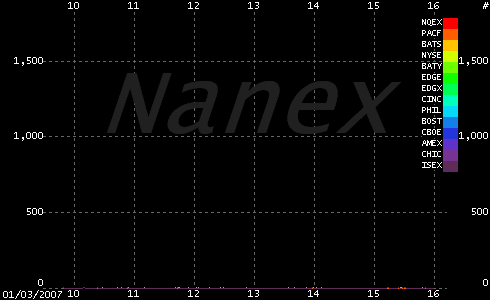I know I've said it before, but it's time to rehash the HFT debate.
Faster and faster turn the wheels of finance, increasing the risk that they will spin out of control, that a perturbation somewhere in the system will scale up to a global crisis in a matter of seconds. “For the first time in financial history, machines can execute trades far faster than humans can intervene,” said Andrew Haldane, a regulatory official with the Bank of England, at another recent conference. “That gap is set to widen.”
Only because we have perverted what markets are.
In addition Felix Salmon over at Reuter's Blog posted this:

A nice chart of HFT activity from 2007-2011. It will peel your wig back. He closed with this:
The stock market today is a war zone, where algobots fight each other over pennies, millions of times a second. Sometimes, the casualties are merely companies like Knight, and few people have much sympathy for them. But inevitably, at some point in the future, significant losses will end up being borne by investors with no direct connection to the HFT world, which is so complex that its potential systemic repercussions are literally unknowable. The potential cost is huge; the short-term benefits are minuscule. Let’s give HFT the funeral it deserves.
Again, we have forgotten what the market is supposed to be.
It is a price-discovery mechanism.
Further, The Securities Act of 1934 tells us that all means by which one may manipulate prices are illegal. Period. The law is clear on this point:
(2)To effect, alone or with 1 or more other persons, a series of transactions in any security registered on a national securities exchange, any security not so registered, or in connection with any security-based swap or security-based swap agreement with respect to such security creating actual or apparent active trading in such security, or raising or depressing the price of such security, for the purpose of inducing the purchase or sale of such security by others.
Got it? The entry of orders for the purpose of other than actually transacting in the security at the given price -- that is, to induce others to trade, to raise or lower the price, to do anything other than to actually transact -- is illegal.
Period.
It is also illegal to:
(1)For the purpose of creating a false or misleading appearance of active trading in any security other than a government security, or a false or misleading appearance with respect to the market for any such security,
So the entry of an order without intent to actually execute is a violation.
All of this arm-waving is a pure refusal to enforce the law. Nothing more, nothing less.
And enforcing the law is easy.
It requires no tax. It requires that you make the following changes:
- All market participants must have margin available to clear all orders they have open at any instant in time on an unaggregated basis. Since you may only enter an order you intend to execute under black-letter law you must be required to have the margin capacity through either cash or secured and proved-available credit, to clear the trade. Period.
- All orders must be exposed to actual execution risk by all market participants. Since you may only enter an order that you intend to execute the market must be able to act on each and every order you place into the market. This requires that each order, once placed, by valid for a reasonable minimum period of time so that it is exposed to a a reasonably-large percentage (for all purposes all) of the market. This means that the minimum human reaction time plus the round-trip time for all reasonable technologies in use must be the minimum order validity time; an order must either be valid for that time or it must execute. A reasonable definition of this time is 2 seconds.
We can fix this problem tomorrow, as I have repeatedly pointed out. You just make all orders valid for at least 2 seconds or until executed and at the same time you require all brokers, dealers and traders to be able to clear via either actual capital or secured and known-good margin loan capacity all orders open at any instant in time without offset or aggregation.
That's it. You do those two things and the entire HFT "baiting game" collapses. Any order placed must be exposed to the risk of execution and any order placed must be able to be cleared by the firm or individual that places it.
End of problem.
So why isn't anyone talking about this?
Because stealing from the public -- and others -- is all the "market" has become. It is no longer a price-discovery mechanism and is now simply a bunch of robots trying to screw one another out of fractions of a cent at a time.


